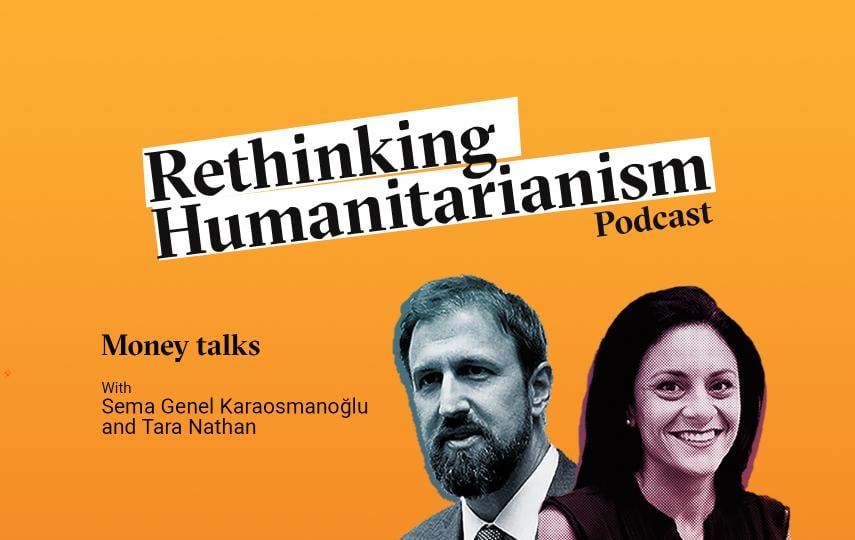Welcome to a new edition of Inklings, where we explore all things aid and aid-adjacent unfolding in the wilds of Geneva, on the front lines of emergency response, or within the lightly shaded cells of financial data spreadsheets.
It’s also available as an email newsletter. Subscribe here.
Today: OECD number-crunching, what to say when you don’t want to say “Houthis”, and the foreign aid that never leaves home.
On the radar|
Money talks: The same numbers can tell different stories. Just look at the recently finalised tallies of what the world’s largest donor governments say they gave in aid in 2022: $211 billion, according to the Organisation for Economic Co-operation and Development. On one hand, it’s a record total for official development assistance, or ODA. On the other, there are the usual gaping caveats.
- Self-help: A lopsided chunk (8.4%) went to Ukraine, while aid dropped to “fragile contexts”, least-developed countries, and small island states. In other words, development aid to many developing countries fell. Much of what’s counted as development aid never leaves home: Nearly a fifth of ODA was what analysts Development Initiatives call “non-transfer aid”. The largest chunk of this is the $31 billion (or 14.6% of ODA) that donor countries counted for processing and hosting refugees. This is billions more than they spent on humanitarian aid, which leads to charts like this:
- What next: There may be reason to count some so-called in-donor refugee costs as aid, but “it was never meant to be of the size that it is today,” said Danish diplomat Carsten Staur, chair of the OECD’s Development Assistance Committee donors’ club. In-donor costs were jarringly large in 2022 because many governments rushed to help Ukrainians. But there’s a 12-month limit on claiming refugee costs as ODA, and not every donor agrees on how to count. The figures for 2023 may be more restrained: “Let’s see what the 2023 data is, and then have a discussion,” Staur said at a briefing.
The WHO’s Shark Tank moment: The World Health Organization wants to revamp the way it’s funded. The health agency’s executive board meets in Geneva until 27 January, where it will consider a plan to launch an “investment round” aimed at solidifying what’s on everyone’s wish list: more predictable and flexible funding. If approved, the first-ever investment round would happen in late 2024, targeting governments, philanthropists, the private sector, and anyone with $7.1 billion lying around.
Acronymage|
- SBA: Sana’a-based authorities. This is the anodyne abbreviation occasionally used instead of the Houthis. The Yemeni rebels are officially called Ansar Allah, which leads to more shorthand: AA. SBA is mostly used by the World Food Programme, which paused much of its food distribution in Houthi-controlled areas in December. A recent Famine Early Warning Systems Network analysis warned that “some SBA areas” could see emergency levels of food insecurity in the coming months.
- FFNPT(I): There’s FFSR, FFFsR, and the FFNPT. Yet the civil society campaign to phase out fossil fuels, the Fossil Fuel Non-Proliferation Treaty Initiative, has somehow resisted the urge to shorten. Climate activist Harjeet Singh, formerly of ActionAid and Climate Action Network International (CAN-I), recently joined.
- GISF: The Global Interagency Security Forum, a UK-based NGO network focused on managing security risks and staff duty of care. Their recent briefing looks at security in urban responses.
End quote|
Asking for money can be awkward. How about asking for billions?
Humanitarian leaders are trying out a new approach to appeals and fundraising in 2024: restraint. Faced with donor pressure to shrink the size of appeals, they’re asking for less, and trying to stick to what they do best.
But that still means billions of dollars in emergency appeals to launch, as UN relief chief Martin Griffiths knows. He told reporters this month that humanitarians are “begging for attention for Ukraine” (and its combined $4.2 billion appeals). On the same day, he helped launch the WHO’s emergency appeal ($1.5 billion).
The UN’s migration agency, IOM, also launched its first-ever global appeal ($7.9 billion). The refugee agency, UNHCR, starts the year looking to fill a $6 billion funding gap. UNICEF is asking for $9.3 billion in funding. Then there are all the other agencies and NGOs, and some 35 individual appeals for country or regional plans.
The sector leans into its funding shortfalls to raise awareness and money. Some say it’s a self-defeating cycle that has to change. But with donor budgets tight and tens of billions of dollars to raise, aid leaders are still searching for the right balance.
The Inklings newsletter: Have any tips, recommendations, or indecipherable acronyms to share? Get in touch: [email protected]




